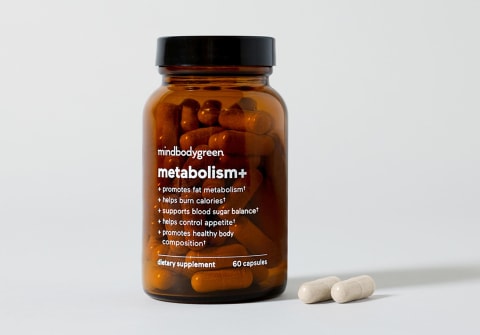Advertisement
Circadian Fasting May Improve Metabolic Health & Blood Sugar Balance


When intermittent fasting gained popularity, it was easily misconstrued as a fancy reason to skip breakfast. And many people proudly chose to have their fasting window go till 1 or 2 in the afternoon and last well into the night. But following this pattern may have you missing out on the metabolic benefits of eating earlier in the day.
Circadian fasting—or early time-restricted feeding—is a lesser-known kind of intermittent fasting that prioritizes an eating window early in the day to align with the body's natural physiological cycles.
An older scientific review published in Nutrients provided a rather promising summary of the most up-to-date studies of the matter, specifically the fast's potential to reduce the risk of Type-2 diabetes and insulin resistance1.
Let's dive into circadian rhythms, fasting, and blood sugar control.
What does it mean to eat in alignment with your circadian rhythm?
The circadian clock is a 24-hour cycle—certain processes happen in order at certain times of the day.
Everything can't happen all at once. For example, melatonin is released at night to make you sleepy, and cortisol (a stress hormone) is highest in the morning to help get you out of bed. Human physiology is, at its core, quite rhythmic. And that holds true for metabolic processes. But certain factors, like eating, can work for or against these natural rhythms.
So a circadian fast aligns your food intake with when you are biologically primed to burn that energy and aligns your fasting window with your body's recovery processes.
The body is more metabolically active earlier in the day and primed to burn energy. Some biological reasons behind this include:
- Improved movement of food through the digestive tract
- Enhanced absorption of nutrients in the intestines
- Improved ability to utilize glucose
- Increased energy expenditure after eating
Amy Shah, M.D., a double board-certified physician and expert on fasting for women, previously told mbg, "When the sun goes down, usually the actions of digestion are turned off and the actions of repair and restoration are turned on. If you eat late at night, you may get slower digestion, inappropriate acid production, and more insulin resistance. This leads to fat gain, G.I. symptoms, and even diabetes..."
Circadian fasting for diabetes & blood sugar management
Eating in alignment with your circadian rhythms means that you're taking advantage of this natural period of higher metabolic activity.
Current studies on meal timing show that early fasting, in particular, can help lower blood sugar (glucose) levels, manage weight, and improve body composition.
Some research indicates that frontloading your calorie intake 2for the day before 3 p.m. is linked to consuming fewer calories daily and eating a higher-quality diet, whereas eating a higher percentage of your daily calories after 8 p.m. is associated with having a higher body mass index (BMI) and body fat.
So there's pretty well-established (and growing) evidence behind eating earlier in the day. What's still emerging, though, is comparing intermittent fasting eating window times.
What the data currently show is that early time-restricted feeding may reduce fasted blood sugar levels and insulin sensitivity—meaning your cells are more responsive to the hormone that helps the body better utilize glucose. And late time-restricted feeding may increase blood sugar levels.
But in terms of fasting, intermittent fasting, in general, is considered a beneficial therapeutic approach to managing Type 2 diabetes3.
Circadian vs. intermittent fasting
Compared to intermittent fasting—which lets you split up a 16-hour fast and an eight-hour eating window any way you like—a circadian fast features an eating window that's earlier but lasts longer. It usually encourages folks to start their fast by 7 p.m. and is broken up into two 12-hour cycles (totaling 24).
So a typical circadian eating rhythm could be between 7 a.m. and 7 p.m. But you could also extend the fasting window to up to 14 hours—both fasts are associated with health benefits.
The takeaway
Circadian fasting may be an easy way to naturally hack your body's metabolism by taking advantage of the biological processes already in place. And while fasting places more emphasis on when you eat, what you eat (as well as targeted metabolic supplements) still plays an essential role in energy regulation.
More research is needed to see if this type of fast offers meaningful metabolic benefits than intermittent fasting alone. But bumping up your meal timing to earlier in the day, which can even help you ditch late-night snacking (and not even miss it) is a good place to start.

Research Reveals The Top 3 Ways To Wake Up Energized Every Morning
Gretchen Lidicker, M.S.

There Are 12 Hallmarks Of Aging—This Vitamin May Improve All Of Them
Molly Knudsen, M.S., RDN

Research Reveals The Top 3 Ways To Wake Up Energized Every Morning
Gretchen Lidicker, M.S.

There Are 12 Hallmarks Of Aging—This Vitamin May Improve All Of Them
Molly Knudsen, M.S., RDN

Research Reveals The Top 3 Ways To Wake Up Energized Every Morning
Gretchen Lidicker, M.S.

There Are 12 Hallmarks Of Aging—This Vitamin May Improve All Of Them
Molly Knudsen, M.S., RDN

Research Reveals The Top 3 Ways To Wake Up Energized Every Morning
Gretchen Lidicker, M.S.

There Are 12 Hallmarks Of Aging—This Vitamin May Improve All Of Them
Molly Knudsen, M.S., RDN















